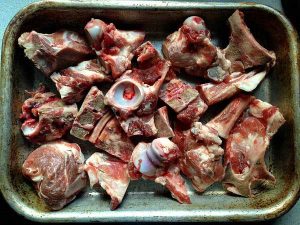The ability of pig bones to absorb radioactive substances has the potential to be used to deal with radioactive contamination around the Fukushima Daichi nuclear power plant.
According to Sputnik, this groundbreaking discovery was made by Dr. Yurina Sekine and her colleagues at the Atomic Energy Agency of Japan.

Pork bones are the raw materials used to cook broth for noodles and pho. (Photo: fearlesseating).
Specifically, the scientists found that “tonkotsu” – pork bones often used to make broth for ramen noodles – have the ability to “absorb harmful substances”.
When soaked in a solution of sodium bicarbonate and water, the bones of the pig transform and reach a “sponge-like state”. They can absorb large amounts of substances such as strontium metal, lead and cadmium which cause cancer.
The new absorption function from pig bones could be used in the future to help clean up contaminated waters around the Fukushima No. 1 nuclear power plant and help prevent the spread of heavy metal contamination in the circuit. Groundwater.
Japanese newspaper Japan Insider points out that while ramen shop owners spend up to 1 million yen (220 million dong) a year to buy boiled pork bones for water, discarded pork bones can be collected, processed to form materials that absorb radioactive material and help protect the environment, while allowing the food industry to save costs.
The Fukushima No. 1 nuclear accident, one of the largest disasters in human history, occurred on March 11, 2011 after the Sendai earthquake and tsunami. This catastrophic incident caused about 160,000 people to be evacuated from Fukushima Prefecture due to high radiation levels.

